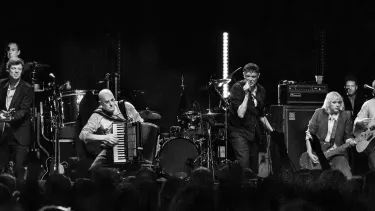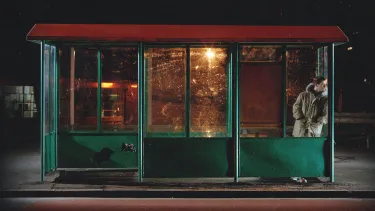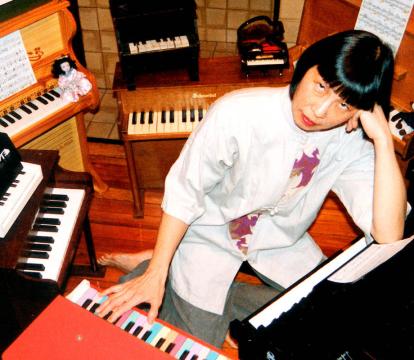Margaret Leng Tan toys with the limits of theatre
The John Cage collaborator and prepared piano pioneer has made her theatre debut – at the age of 74
In the lead up to our Piano Day 2020 exclusive broadcast, we profiled some of the pioneers of the foundational instrument.
Watch Margaret Leng Tan perform John Cage's 'Dream' (14:20) in the full Piano Day stream:
“It’s my theatre debut!” she repeats in her rich, deep voice, clearly delighted with the unexpected turn her career has taken.
The show originated as a memoir, but Margaret Leng Tan soon realised she would never get around to writing it – or not yet anyway. And eventually, she and Erik Griswold, an American composer who now lives in Brisbane, decided to create a “sonic memoir” that evolved into a “sonic portrait”.
Dragon Ladies Don’t Weep is the latest creation from the virtuoso musician who is better known for her experimental work on the prepared piano and her arrangements for the toy piano, which have given her the mantle ‘Queen of the Toy Piano’. It premiered in Melbourne last month to five star reviews, with Stage Whispers saying it was “a masterful experimental collage of music, spoken word, performance and visuals”.
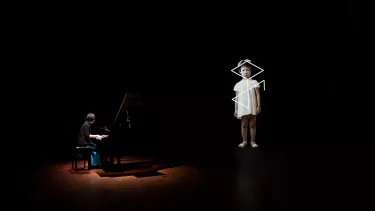
Directed by Tamara Saulwick, it comprises 14 pieces of music, video projections by Chunky Move’s Nick Roux that include footage from Margaret’s life and, of course, toy piano, grand piano and a marvellous assemblage of instruments and objects – including toy telephones – that all serve to create music.
The show pays homage to the important things in her life – her mother, who died at the of 98; experimental musician John Cage; her many rescue dogs – and doesn’t shy away from the difficulties. Margaret has had obsessive compulsive disorder since she was a child and the condition takes centre stage with counting – a manifestation of her condition – woven into the musical pieces.
She is absolutely sanguine about revealing what she calls “my OCD” to the public night after night.
“Listen, I have paid the price for having this disorder. So I might as well exploit it for all its worth,” she says, with raucous laughter. “If I can exploit it and use it in a creative way then go for it, girl. I mean it has taken such a toll on my life, it’s payback time.”
Margaret was diagnosed with OCD as a child in Singapore. Perhaps this is why she told her parents, at the age of six, that she must begin learning the piano. Fortunately they agreed, and ten years later she was on her way to New York having obtained a scholarship to Juilliard, where she would become the first woman to graduate with a doctorate.
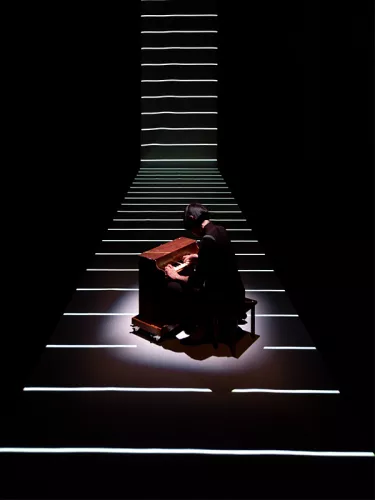
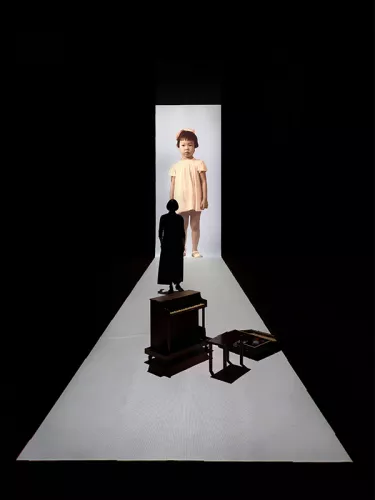
In New York, she discovered someone who would teach more than she had learned in college: influential musician John Cage. She won’t reveal how they met as, she says, it’s a big part of the show.
“In the production I tell two stories of when I met John Cage for the first time and when I really met John Cage. So I don’t want to give it away. He features very prominently because he had such an influence on me.
“And I feel very strongly that John Cage’s presence has permeated this production because of his belief that any object that can produce sound is capable of making music. I am fulfilling that but I’m also fulfilling another equation of his that he really believed in and that is simply this: art equals life equals theatre. I’m living my life on stage in Dragon Ladies.”
Cage died in 1992. Yet even after his death, Margaret’s mentor still had the ability to transform her career. She had not yet discovered the toy piano, but in preparing for a memorial tribute for him a year later at New York’s Lincoln Centre, she included his suite for toy piano, which he had written in 1948.
“I made a program that included all the different kinds of pianos that John Cage wrote for which included: regular piano; prepared piano; string piano, where you pluck the strings; bowed piano, where you bow the strings; and toy piano. I wanted to show the tremendous range of his creativity just through the piano alone.”
Margaret bought her first toy piano from a thrift shop for $45. “It had a beautiful tone, a lovely irresistible quality,” she says, and after mastering Cage’s piece, she realised the “toy” had the potential to become a “real” instrument. Soon her composer friends were writing pieces for her and she was arranging songs she thought demanded to be heard on her newly discovered instrument: Bach, Philip Glass, Erik Satie. “And in the end I thought they sounded better on the toy piano because of its magical character!”
This led to the 1997 album The Art of the Toy Piano and a coronation: Margaret Leng Tan was now known as the Queen of the Toy Piano. She says she has since collected about 30 toy pianos “in various stages of efficiency. I have my top of the line touring ones and I have antiques and curiosities.”
As Margaret’s artistic career takes a new turn into theatre with Dragon Ladies Don’t Weep, the toy piano has not been forgotten: it is an integral part of the show, and she will continue to do concert performances. But the theatre experience has been such an unexpected joy, especially after years of insisting on working autonomously, that she hopes it will have a long life and she can tour it around the world. She is thrilled that it has given her the opportunity to perform at the Opera House.
“I remember my father telling me about it when the Sydney Opera House was first built because he went to Sydney and that’s 40 years ago!” she says. “And I finally got to see it for myself and now I'm going to be playing in it. To me it's just an unbelievable turn of events.”
While Margaret performs in Dragon Ladies, the future of the toy piano is in safe hands: since she legitimised the instrument by using it in a concert setting to play classical and pop pieces, many others have done the same – there are even toy piano summits held around the world.
“Yes, people have followed in my footsteps and it’s just wonderful,” says Margaret. “The toy piano is going to be my legacy and it will live on after I've gone. Its future is alive and well.”
You may also like
